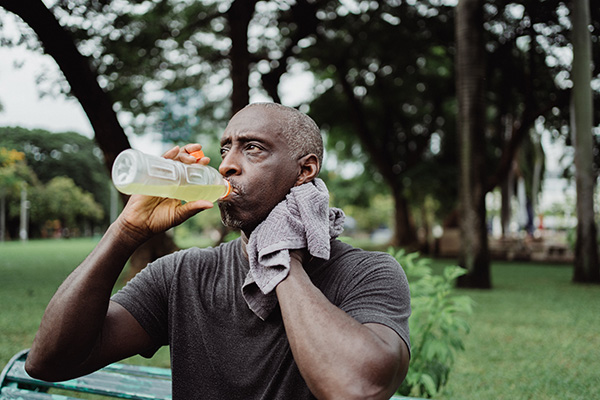Study to explore potential for using app to measure hydration
Staying hydrated by drinking fluids is about more than quenching your thirst. Joints work better and can absorb the shock of movement. Toxins get flushed, your skin is more resilient and your kidneys can better remove waste.
But as you go from a workout at the gym to work or back home, how do you know if you’re hydrated?

KU researchers are launching a project by the Gatorade Sports Science Institute to study if there’s a way to measure hydration status on the go, using the camera on your cell phone. Potential study participants ages 18-65 can sign up to participate through Feb. 9.
The study is focused on a new imaging method called transdermal optical imaging, or TOI, which has been shown to detect blood flow in the face. If a person is well-hydrated, blood can flow more easily throughout the body, which may be detectable with TOI. The study will determine the effectiveness of a smartphone application that utilizes TOI to measure hydration status throughout the day.
“Typically, scientists and clinicians have had to rely on an invasive, time-consuming process to measure hydration,” said Calissa Leslie-Miller, KU doctoral student in Clinical Child Psychology. Leslie-Miller is coordinating the study in the research lab of Christopher Cushing, an associate scientist at the KU Life Span Institute and an associate professor in clinical child psychology and applied behavioral science.
If the app is shown to be effective, someday individuals could get real-time data about their specific patterns and needs, she said.
KU is one of a handful of universities facilitating the study in partnership with the Gatorade Sports Science Institute. Participants accepted for the study will be asked to complete four sessions on campus, each 10-15 minutes long, over the course of 24 hours. They will receive between $75-$125 in complimentary Gatorade merchandise.
“I'm excited to be involved in this project because I want to take part in this significant leap forward in personalized health and well-being,” said Leslie-Miller. “This technology advancement has the potential to empower individuals with valuable insights into their body's hydration needs.”
Questions can be sent to study administrators at GSSIResearchStaff@pepsico.com.